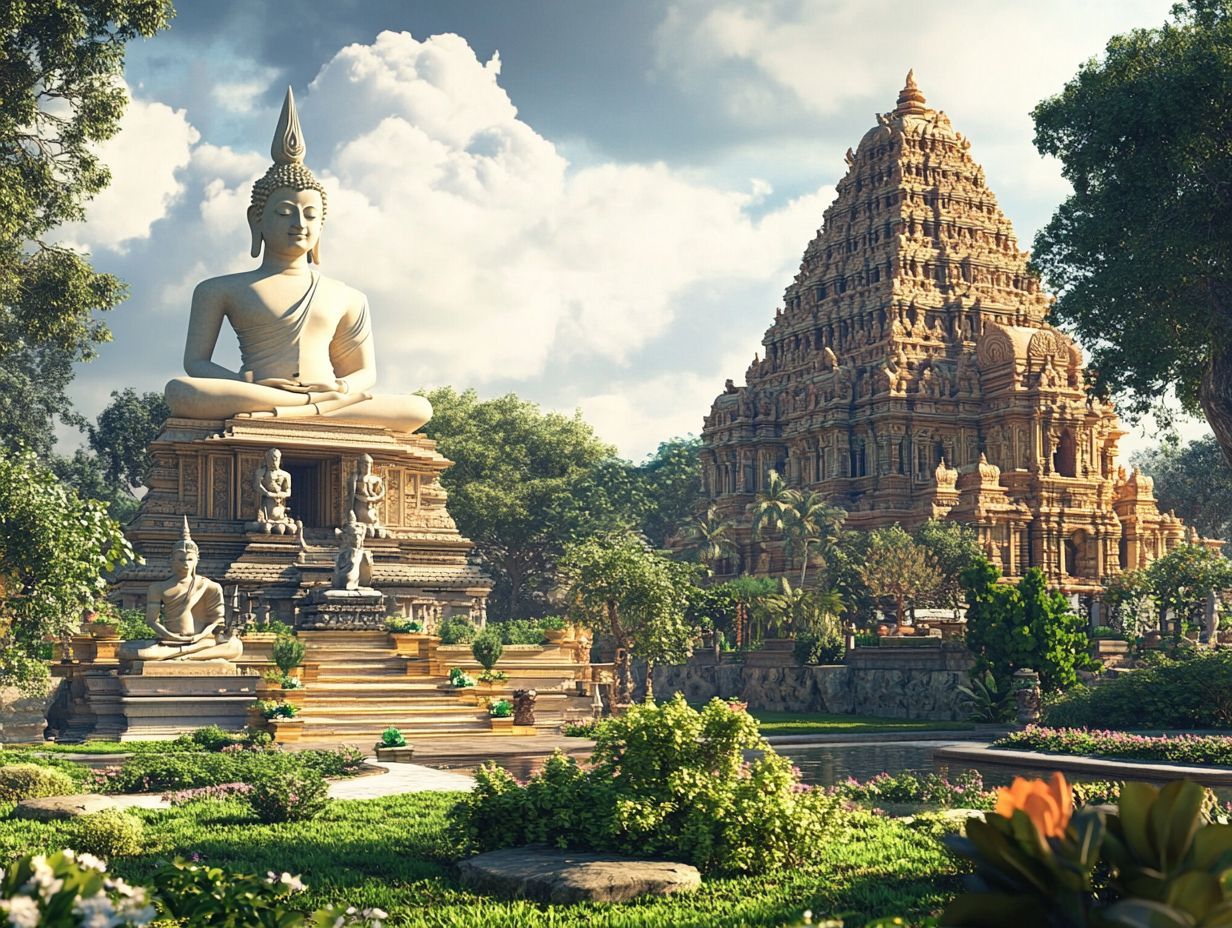What Does Buddhism Forbid That Hinduism Allows?
Buddhism and Hinduism, two of the world s oldest religions, present a wealth of perspectives on morality, ethical living, and spiritual practices. While there exists a shared foundation between them, their teachings diverge markedly in terms of what constitutes forbidden or acceptable behavior, guided by their distinct sacred texts and philosophies.
This exploration delves into the prohibitions in Buddhism, scrutinizing concepts such as attachment, violence, and misconduct, and subsequently juxtaposing these with the allowances in Hinduism, including practices such as animal sacrifice and the role of the caste system.
Key differences between these two spiritual paths will be illuminated, offering insights that may enrich one s understanding of both traditions, including their unique approaches to concepts like karma, reincarnation, and the ultimate goal of spiritual liberation, whether it be moksha or nirvana.
What is Forbidden in Buddhism?

In examining the moral codes of Buddhism, it is crucial to understand what it forbids.
In Buddhism, various actions and practices are considered forbidden, as they fundamentally contradict the core teachings designed to alleviate suffering and facilitate the journey toward enlightenment and liberation from samsara.
Among these prohibitions, attachment and desire stand out as significant obstacles to spiritual liberation, perpetuating the cycle of samsara and exposing individuals to the pain of suffering and rebirth.
Furthermore, acts of violence and killing are strictly prohibited, underscoring the principle of ahimsa, or non-violence, which serves as a cornerstone of Buddhist ethics.
Moreover, behaviors such as lying, stealing, and indulging in intoxicants impede one’s capacity to practice mindfulness and maintain ethical conduct, ultimately obstructing the path to enlightenment, self-realization, and liberation.
1. Attachment and Desire
Unlike Buddhism, which tends to regard attachment and desire as significant obstacles on the path to enlightenment, Hinduism presents a more nuanced perspective. It recognizes that certain desires can indeed lead to a sense of fulfillment and a deeper connection with the divine. This viewpoint emphasizes that attachment, when focused on spiritual objectives rather than material pursuits, can serve as a powerful motivator for personal growth and spiritual advancement.
Attachment and desire stand as pivotal concepts in Buddhism, intricately woven into the fabric of the human experience, as they lead to suffering and obstruct the path toward enlightenment. The teachings emphasize that clinging to desires fosters attachments that obscure judgment and perpetuate the relentless cycle of samsara.
These attachments often ensnare individuals in a web of fleeting pleasures and material possessions, engendering a profound sense of unfulfilled longing that diverts them from deeper spiritual pursuits. As one embarks on the transformative journey of self-discovery, the importance of recognizing these patterns becomes increasingly evident; only through comprehending the root of suffering, driven by ignorance and attachment, can they attain liberation from desire.
Mindfulness and meditation serve as essential practices for individuals seeking to cultivate awareness that transcends immediate wants, thereby fostering a state of inner peace and self-cultivation. Ultimately, embracing non-attachment not only alleviates distress but also ushers in authentic happiness and fosters a sense of interconnectedness with all beings, reflecting the principles of compassion and selflessness.
2. Killing and Violence
The prohibition against killing and violence in Buddhism is intricately linked to the principle of ahimsa, or non-violence, which champions compassion for all living beings. This ethical foundation asserts that every form of life is worthy of respect and protection, transcending individual existence and promoting a universal ethic.
By embracing this principle, practitioners are encouraged to cultivate an inner sense of peace that effortlessly radiates into their interactions with others. This moral framework, which emphasizes ethical conduct and community ethics, invites individuals to engage in practices of compassion that nurture harmony within themselves and foster understanding within their communities.
The teachings clearly articulate that any act of violence, even in the face of provocation, fundamentally undermines the essence of compassion and inevitably leads to suffering. Consequently, adherents of Buddhism diligently seek peaceful resolutions, embodying kindness in their thoughts, words, and actions, thus reflecting their unwavering commitment to a life grounded in non-violence.
3. Lying and Stealing
Within the spiritual restrictions of Buddhism, lying and stealing are particularly emphasized.
Lying and stealing are viewed as grave offenses in Buddhism, as they contravene the ethical principles that underpin mindful living and truthful interactions. Such acts of deceit and theft not only disrupt social harmony but also undermine an individual s spiritual integrity.
These actions generate personal turmoil and send ripples through the community, eroding trust and cultivating an atmosphere of fear and suspicion. When individuals place their desires above integrity, they compromise the collective well-being, resulting in fractured relationships.
Mindfulness is instrumental in fostering an awareness of the repercussions of unethical behavior, prompting individuals to pause and reflect before they act. By committing to ethical conduct, communities can create environments where empathy, respect, and cooperation flourish, ultimately contributing to a more harmonious society and aligning with the ethical principles taught in the Tripitaka.
Thus, it is imperative for all to acknowledge the significance of nurturing honesty, as it strengthens both personal connections and communal bonds.
4. Intoxication and Addiction
Among the myriad ethical dilemmas in Buddhism, intoxication and addiction are critically viewed.
In Buddhism, intoxication and addiction are regarded as significant impairments to both the mind and spirit, hindering individuals from practicing mindfulness and achieving the clarity essential for spiritual advancement. These substances often engender a state of indulgence that diverts attention from one’s ethical and spiritual aspirations. Such indulgences not only obscure judgment but also impair the capacity for meaningful reflection, a cornerstone of personal growth.
When individuals lose sight of mindful living, their journey toward enlightenment becomes obstructed by cravings and attachments. This departure from an ethical lifestyle can cultivate negative emotions, such as guilt and shame, which further complicate one’s spiritual path.
For those endeavoring to embody Buddhist principles and the teachings of the Buddha, the struggle with addiction transcends personal hardship; it becomes a profound barrier that obstructs their pursuit of inner peace and a life rooted in compassion and spiritual enlightenment.
5. Sexual Misconduct
Sexual misconduct is regarded as inappropriate within Buddhism, as it can lead to suffering, betrayal, and emotional turmoil, thereby disrupting the spiritual journey toward enlightenment and challenging the community s ethical standards.
Sexual misconduct is regarded as inappropriate within Buddhism, as it can lead to suffering, betrayal, and emotional turmoil, thereby disrupting the spiritual journey toward enlightenment. Ethical conduct is vital for fostering healthy relationships and promoting compassion within the community.
When individuals practice selflessness and uphold the principles of ethical conduct, they contribute not only to their own spiritual awakening but also to the cultivation of an environment in which mutual respect thrives and aligns with community ethics. This nurturing atmosphere encourages open communication and trust, essential components for communal harmony. By prioritizing compassion, practitioners develop a deeper understanding of one another s experiences and struggles, ultimately fortifying their bonds.
As the community collectively embraces these values, it paves the way for shared growth and healing, enabling all members to advance toward their spiritual aspirations without the encumbrance of misconduct casting a shadow over their path.
What is Allowed in Hinduism?

In Hinduism, a myriad of practices and beliefs serves as pathways to spiritual growth, cultivating a profound sense of devotion and connection to the divine.
Rituals, whether they manifest as daily offerings or grand festivals, occupy a central position within Hindu culture, enabling practitioners to articulate their faith and seek the blessings of deities.
Additionally, the acceptance of diverse beliefs spanning from polytheism to monotheism exemplifies the richness of the Hindu worldview. This inclusivity promotes various practices, including meditation, yoga, and ethical conduct, all serving as avenues toward personal enlightenment and fulfillment.
1. Attachment and Desire
Unlike Buddhism, which tends to regard attachment and desire as significant obstacles on the path to enlightenment, Hinduism presents a more nuanced perspective. It recognizes that certain desires can indeed lead to a sense of fulfillment and a deeper connection with the divine. This viewpoint emphasizes that attachment, when focused on spiritual objectives rather than material pursuits, can serve as a powerful motivator for personal growth.
Within Hindu thought, the celebration of life s pleasures is evident through various rituals and spiritual practices, highlighting the importance of indulging in moderation. Devotees often find that their commitment to spirituality is enriched by the enjoyment of material blessings, as long as these experiences are approached with a mindset of non-attachment and aligned with ethical principles.
In contrast, Buddhism promotes a philosophy centered on minimal desire, encouraging practitioners to rise above worldly temptations in the quest for enlightenment and self-realization. This philosophical divergence showcases the rich diversity within Hinduism, where the pursuit of spiritual fulfillment coexists harmoniously with an acceptance of life’s sensory experiences. In this way, Hinduism creates a path that elegantly balances material engagement with spiritual aspirations.
2. Killing and Violence
In Hinduism, killing and violence are generally regarded with disfavor, particularly when viewed through the lens of ahimsa, a foundational ethical principle advocating for non-violence. Yet, Hindu scriptures, including the Vedas, reveal a more complex interplay between violence and dharma, illustrating the nuanced relationship that exists between these concepts.
These sacred texts, such as the Vedas and Tripitaka, often present ethical dilemmas that challenge the believer, illuminating the intricate ways in which cultural practices influence moral understanding. For example, the epic narratives of the Mahabharata delve into scenarios where warfare and violence are deemed justifiable in the pursuit of righteousness, or dharma, sparking profound discussions about the conditions under which harmful actions may be permissible, reflecting the principles of ahimsa and non-violence.
Nevertheless, the prevailing message throughout these teachings consistently underscores the significance of compassion, urging followers to pursue avenues that minimize harm in their dealings with others. This delicate balance between the commitment to dharma and the principles of ahimsa mirrors the broader moral landscape that practitioners must navigate.
3. Lying and Stealing
In Hinduism, lying and stealing are viewed as profoundly immoral actions that contravene the ethical principles essential for moral conduct and social harmony. The cultural values ingrained in Hindu society emphasize truthfulness and respect for the property of others.
Such actions not only disrupt an individual’s spiritual journey but also contribute to societal discord, eroding trust within communities. Within Hindu philosophy, making ethical lifestyle choices is paramount, urging practitioners to uphold honesty and integrity. The concept of compassion is equally significant, prompting individuals to reflect on the effects of their actions on others and fostering a shared sense of responsibility.
Moreover, the belief in karma reinforces the understanding that deceit and theft inevitably lead to negative consequences. This principle serves as a reminder that one s choices shape their destiny, and that commitment to ethical conduct ultimately results in both personal fulfillment and communal well-being.
4. Intoxication and Addiction
Hinduism firmly discourages intoxication and addiction, as these vices undermine one’s spiritual discipline and clarity of thought. Engaging in such behaviors can significantly impede an individual s capacity to uphold ethical conduct and fully immerse themselves in their spiritual journey.
These distractions can create a rift between individuals and their true selves, complicating the pursuit of mindful living. By nurturing awareness and fostering self-realization, practitioners are better equipped to navigate their spiritual paths, ultimately attaining a profound understanding of their true essence.
The teachings of Hinduism eloquently assert that ethical conduct is paramount for spiritual growth; without it, the path can become obscured. This perspective encourages individuals to contemplate their choices and recognize how detrimental habits can obstruct their connection to the divine, consuming the very energy necessary for transformative experiences.
5. Sexual Misconduct
In Hinduism, sexual misconduct is regarded with disapproval, as it disrupts the sanctity of relationships and undermines ethical conduct. It is crucial to uphold principles of devotion and compassion within relationships to maintain harmony within the community.
Such actions inflict profound personal harm and send ripples through the broader spiritual community, challenging the foundational values of selflessness and integrity that unite individuals. When the principles of devotion are compromised, the collective pursuit of spiritual growth and mutual respect becomes impeded. This disruption can lead to a fracture of trust among community members, making it imperative to confront these ethical violations with openness and compassion.
By cultivating an environment where respect for others is paramount, the community can inspire individuals to embody the virtues of selflessness and care. This ensures that every relationship honors the sacred bonds defined by divine love and ethical responsibility.
What are the Major Differences between Buddhism and Hinduism?

Buddhism and Hinduism, though intertwined by historical roots and certain shared beliefs, manifest distinct philosophies and practices that delineate their spiritual frameworks. The fundamental tenets concerning the self, the interpretation of karma and reincarnation, and the ultimate aspirations of enlightenment serve to differentiate these two religions markedly.
For example, Buddhism places a strong emphasis on the principle of non-attachment, which aims to alleviate suffering. In contrast, Hinduism embraces a more expansive acceptance of deities and rituals, accommodating the diverse spiritual journeys of individuals.
1. Beliefs about the Self
In Buddhism, the understanding of the self stands in stark contrast to that of Hinduism. Buddhism introduces the concept of anatta, or non-self, asserting that the self is an illusion that ultimately leads to suffering. In contrast, Hinduism teaches that the self, or Atman, is eternal and inherently seeks union with the ultimate reality known as Brahman.
These divergent beliefs significantly shape the spiritual practices and ethical frameworks adhered to by their followers. For example, the Buddhist path encourages practitioners to cultivate non-attachment to worldly desires and the ego, as clinging to the idea of a permanent self obstructs the journey toward enlightenment. Conversely, Hinduism places a strong emphasis on realizing one’s true self through meditation, devotion, and ethical living, guiding individuals toward experiencing oneness with Brahman.
As a result, these foundational beliefs not only influence personal perceptions of existence but also profoundly impact the overall journey toward spiritual awakening.
2. Views on Caste System and Social Hierarchy
The caste system represents a significant social structure within Hinduism, delineating one s social status and responsibilities as part of their dharma. In stark contrast, Buddhism actively rejects this hierarchical organization, championing equality among all individuals regardless of their birth circumstances. This fundamental divergence highlights the differing ethical approaches of the two religions, reflecting their respective spiritual practices.
The implications of this disparity resonate deeply, influencing not only individual lives but also shaping societal norms. Adherents of Hinduism may encounter ethical dilemmas as they navigate their prescribed roles, given that strict compliance with the caste system can perpetuate systemic injustice and inequality.
Conversely, Buddhist teachings underscore the importance of compassion for all beings, advocating for a path that emphasizes moral integrity and social harmony.
This commitment to equality encourages practitioners to engage in acts of kindness and support for the marginalized, thereby fostering a culture of inclusivity. Ultimately, a thorough examination of these contrasting perspectives unveils critical insights regarding ethical conduct and the pursuit of social justice in the contemporary world.
3. Attitude towards Gods, Deities, and Worship Practices
Buddhism primarily emphasizes the teachings of the Buddha, refraining from the worship of deities, while Hinduism presents a rich and intricate tapestry of gods and goddesses, actively encouraging polytheistic worship. This fundamental distinction significantly influences the spiritual practices and beliefs inherent to each religion.
In Buddhism, practitioners cultivate devotion through a deep understanding and application of the Buddha’s teachings, prioritizing meditation and mindfulness practices over ritualistic worship. This approach nurtures a spiritual community, or sangha, that centers around the quest for enlightenment and personal growth, rather than seeking favors from divine beings.
Conversely, Hinduism s celebration of various deities not only enhances its rituals, such as puja, but also fosters profound personal connections to the divine. Individuals engage in practices that resonate with their unique beliefs or family traditions, enriching their spiritual experience. This diversity underscores the contrasting expressions of devotion, dharma, and spiritual practices, shaping community dynamics and influencing collective rituals in distinct and meaningful ways.
4. Approach to Enlightenment and Spiritual Paths
The approach to enlightenment showcases a striking contrast between Buddhism and Hinduism. In Buddhism, the focus centers on the Eightfold Path and the Four Noble Truths, which serve as guiding principles toward achieving nirvana. In contrast, Hinduism presents a multitude of paths, including bhakti, meditation, and karma yoga, all aimed at attaining moksha and liberation from samsara.
While both traditions emphasize an ethical lifestyle and the journey of self-discovery, their methodologies diverge in compelling ways. Buddhists often engage in specific meditation techniques designed to cultivate mindfulness and awareness, crucial tools for understanding the nature of suffering and recognizing the impermanence of existence. On the other hand, Hinduism offers a vibrant tapestry of practices, allowing individuals to explore various forms of meditation ranging from silent contemplation to the rhythmic chanting of mantras each aimed at deepening one s connection to the divine and realizing the true self or Atman.
As seekers navigate these distinct paths, they discover unique expressions of spirituality and self-cultivation that resonate profoundly with their personal journeys, ultimately guiding them towards liberation and transcendence.
5. Practices and Rituals
Buddhism and Hinduism encompass a rich tapestry of practices and rituals, each serving distinct purposes within their respective traditions. Buddhism prioritizes meditation and mindfulness as essential tools for fostering self-awareness, while Hinduism places considerable emphasis on ceremonial rituals and festivals, viewing them as vital expressions of devotion.
In both faiths, engaging in these practices is paramount for cultivating a deeper connection with the divine and nurturing ethical conduct among adherents. Mindfulness, as practiced through Buddhist meditation, invites individuals to develop a heightened awareness of their thoughts and actions, ultimately facilitating personal transformation and spiritual clarity.
Conversely, the cultural practices within Hinduism, such as daily pujas and significant life events, offer a structured framework that enables individuals to express their devotion and align their lives with dharma.
Together, these varied approaches enrich the spiritual landscape of each tradition, inspiring followers not only to pursue enlightenment but also to act ethically within their communities.
Frequently Asked Questions

What does Buddhism forbid that Hinduism allows?
Buddhism forbids the belief in an eternal self or soul, while Hinduism allows for the belief in an eternal soul.
Can Buddhists eat meat?
While some sects of Buddhism may have dietary restrictions, there is no specific rule against eating meat. In contrast, Hinduism generally prohibits the consumption of beef.
Is divorce allowed in Buddhism and Hinduism?
In both Buddhism and Hinduism, marriage is considered a sacred bond and divorce is not encouraged. However, Buddhism does allow for divorce in certain circumstances, while Hinduism views marriage as a lifelong commitment.
Are there any differences in the treatment of women between Buddhism and Hinduism?
Buddhism and Hinduism both advocate for equal treatment of all beings, regardless of gender. However, in some Hindu traditions, women may be viewed as subordinate to men, while in Buddhism, women can attain enlightenment just as men can.
Can Buddhists and Hindus practice each other’s religions?
While there may be some overlap in beliefs and practices, Buddhism and Hinduism are distinct religions with their own set of beliefs and practices. Therefore, it is not common for adherents of one to practice the other.
Is there a concept of sin in Buddhism and Hinduism?
In Buddhism, there is the concept of karmic consequences for one’s actions, but it is not viewed as a sin or a violation of a divine law. In Hinduism, the concept of sin varies among different sects and traditions, but it is generally viewed as a violation of dharma or natural order.
